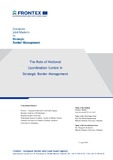The Role of National Coordination Centre in Strategic Border Management
Kokkuvõte
Interagency cooperation and exchange of information is an important part of Integrated border management (IBM) concept, therefore the role of National coordination centres as a main information manager is becoming more relevant in nowadays strategic border management.This paper will focus, compare and analyse the role of National coordination centres in three Baltic States –Lithuania, Latvia and Estonia. The countries for research and comparative analysis are similar of geographical position, common historical and political background and they are facing common threats.
Kirjeldus
1. Introduction ; 2. Literature Review ; 2.1. Meaning and nature of strategic management ; 2.2. Impact to security situation through cooperation ; 2.3. Exchange of information as part of cooperation ; 2.4. Variety of coordination theory concepts ; 3. Research Methodology ; 3.1. Research design ; 3.2. Methods of data collection ; 3.3. Data analysis ; 3.4. Ethical issues ; 3.5. Quality aspects: reliability, validity and generalization ; 4. Analysis and Result ; 4.1. General description of National coordination centres in border management system–genesis, mission, functions, structure, personnel ; 4.2. National coordination centre in Lithuania ; 4.3. National coordination centre in Latvia ; 4.4. National coordination centre in Estonia ; 5. Discussion of Results, Conclusions and Recommendation



